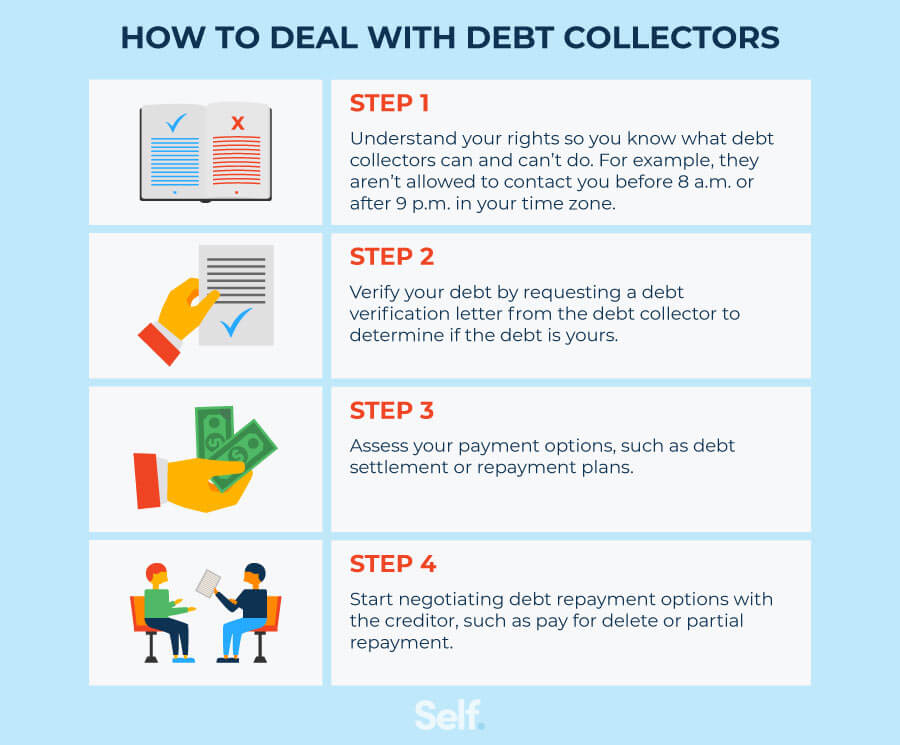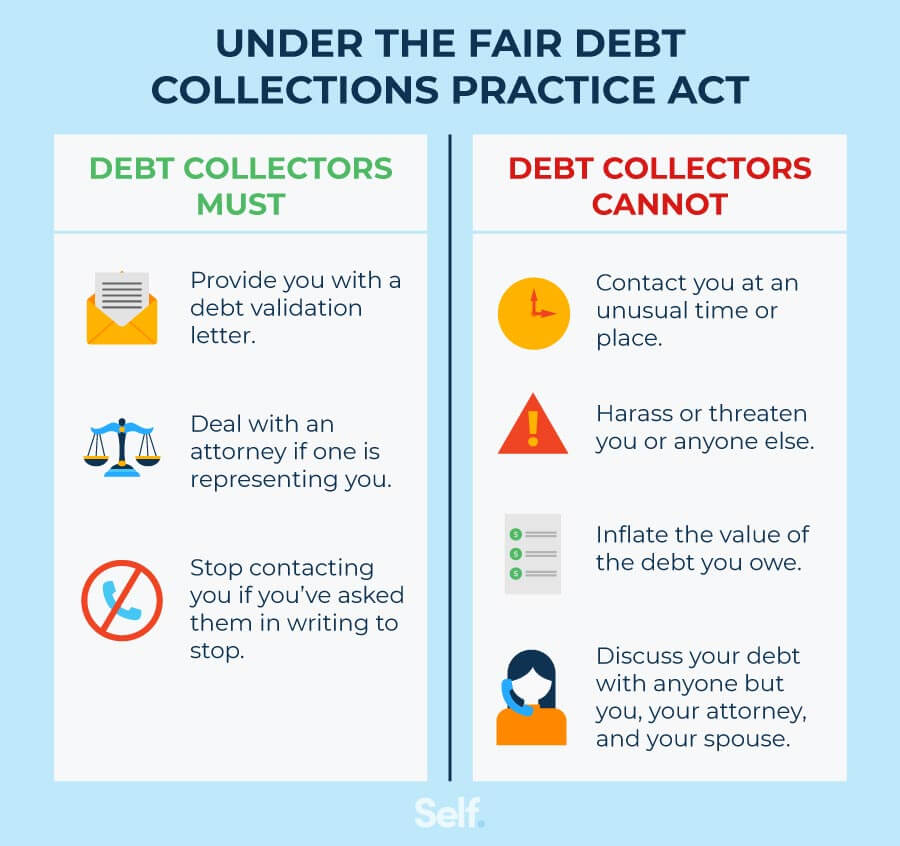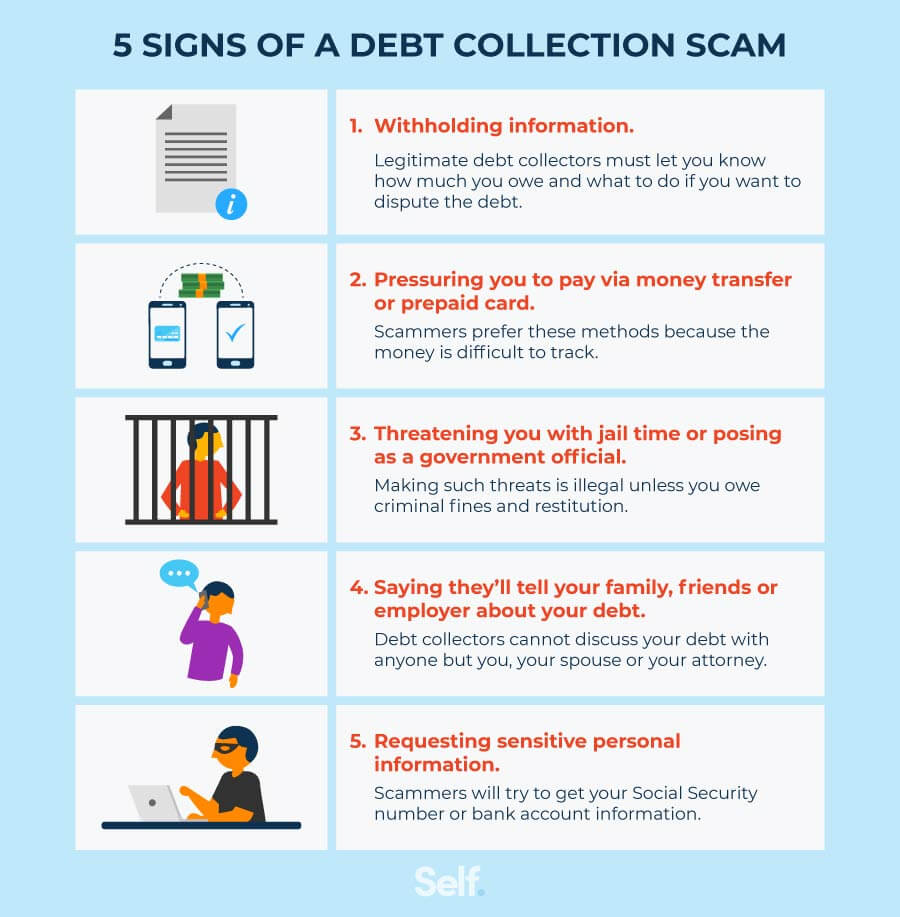How To Deal With Debt Collectors
Published on: 08/26/2022
Debt collectors contacting you to collect past-due debt can cause anxiety, especially if you can’t pay off the debt. It’s important for you to know your rights and understand how to handle them.
This article will give you some tips on how to deal with debt collectors when they contact you, what your rights are, and how to be on the lookout for scams.

1. Understand your rights
Debt collectors are expected to follow consumer protection rules and guidelines laid out by the Fair Debt Collection Practices Act (FDCPA). Debt collectors can call you, contact you via text message, email you, and even send private messages to your social media, but there are limitations to when and how they can contact you.[1] That’s why it’s essential to know your rights.
Debt collectors cannot do any of the following:
- Contact you before 8 a.m. or after 9 p.m. in your time zone. What’s more, they can’t try to contact you at an inconvenient time and place.
- Harass or threaten you or your family members. Debt collectors aren’t allowed to harass you or your loved ones. They can’t threaten you with violence or harm, and they can’t use obscene language or call you repeatedly to annoy you.
- Lie about how much you owe, being a government official, or who they are. They also can’t falsely threaten to arrest you or seize your property unless it can be done legally.
- Continually contact you if you’ve written to them to stop.
- Contact you until they can verify your debt if you disputed the debt in writing.
- Discuss your debt with anyone but you, your spouse, or your attorney. This includes a ban on contacting you with a public message on social media.
- Contact you at work if you’ve let them know you’re not allowed to receive debt communications there.
- Contact you personally instead of your attorney. If they know an attorney is representing you about the debt, they must work with the attorney.[2]
Debt collectors can do any of the following:
- Contact you during daytime hours.
- Send letters.
- Email you.
- Contact you by text message.
- Contact you to confirm there will be no further contact after you told them to stop.
- Contact you to notify you of their intent to take legal action, such as filing a lawsuit against you.
- Contact you concerning any debt not excluded by the FDCPA (see the list below).
Debt collectors must:
- Stop contacting you if you’ve asked them in writing to stop.
- Talk with your attorney rather than contacting you directly if you have legal representation regarding the debt.
- Provide you with a debt validation letter within five days of first contacting you about a debt.
2. Verify your debt
Federal law requires a debt collector to give you a debt validation letter within five days of their first contact with you about a debt. This letter must contain the following information and notices:
- Name of the creditor or original lender.
- Amount of the debt.
- Notice of your right to receive the name and address of the original creditor on request.
- Notice that if you fail to dispute the information in writing within 30 days, the collector will consider it valid.
- Notice that the collector will obtain verification of the debt in the event of such a dispute.
3. Assess your payment options
Don’t let a debt collector intimidate you into making a payment. There’s a potential downside to doing so before you negotiate a settlement: collection agencies have a limited number of years to ask you to pay before the debt becomes “time-barred.” But if you make a payment after that clock starts ticking, it can be reset and start all over again.
4. Start negotiating
If you can’t pay your debt all at once, you may want to negotiate with the collector and try to reach a settlement. This is far better than simply ignoring the debt because interest can continue to accrue, and worse, the collector could take you to court and win a judgment against you. In that case, they might be able to collect what the court says you owe by garnishing your bank account or by wage garnishment. However, this may depend on the type of debt you have as well as state laws.[3]
Negotiations can lead to several different outcomes you may wish to explore:
- Pay for delete — You can write a pay for delete letter asking the collector to remove any negative item from your credit report in exchange for paying off the full amount of the debt. Pay for delete is not a guaranteed strategy. Paid collection agencies may be more willing to accept a pay for delete than original creditors. If accepted, this may help your credit score, which in turn could open the door to future loans and more favorable terms down the road. Keep in mind that if the debt is forgiven, you may be subject to paying any taxes on the forgiven debt.[4]
- Partial repayment — See whether the collector is willing to accept partial payment in lieu of full payment. As with any negotiation, start low by offering maybe 25 cents on every dollar you owe. The collector may demand more, but at some point, they may conclude that something is better than nothing, especially if you offer a lump sum. While this may satisfy the collector, your credit report may still show a negative mark since the settlement would not be paid in full [5].
- Payment plan — Set up a proposed payment plan to resolve your debt. Take your monthly budget into account and determine what’s reasonable. A collector may be willing to offer you some flexibility on monthly payments if you explain your financial situation and what you’re able to pay.[6]
Once you’ve reached an agreement, be sure you get the terms of the settlement in writing so you have documentation.
Debt collection FAQs
You may have a number of questions about how debt collection works and what your options are. We’ll guide you through commonly asked questions.
What debts can be sent to collections?
The following types of debts can be sent to collections:[7]
- Bank fees and overdrafts
- Car loans
- Credit card balances
- Medical bills
- Personal loans
- Student loans
- Utility bills
- Court imposed fines and fees, including government and law enforcement agencies, such as parking tickets[8]
Note that the list includes both loans and bills you’ve failed to pay. Failure to pay what you owe can reflect negatively on your credit history, as missed payments are reported to the three major credit bureaus and can remain on your credit history for seven years.
Medical bills are a little different. Starting July 1, 2022, the three major credit bureaus will discard medical debt sent to collections from credit reports once it has been paid off. Additionally, unpaid medical debt will appear on your credit reports after a year has passed, instead of after six months. And beginning in 2023, medical debt below $500 will no longer appear on credit reports.[9]
What should I do if I can’t pay my debt?
Negotiating with creditors and bill collectors is a good option, but what if you still can’t pay off your debt? First, consider how long you’ll be unable to pay. If it’s short-term, you may have room to negotiate with creditors and come up with a payment plan.
If you don’t know when you’ll be able to pay and feel like you’re out of options, consider credit counseling. Make sure to weigh any fees and do what you can yourself. Counselors can help you come up with a debt management plan for debt that is not charged off and may give you solutions you weren’t aware of. However, keep in mind that the debt management plan would appear on your credit report for lenders to view and your score may drop at the start of the plan, but should improve over time.[10]
If you have multiple accounts in collections, you may want to seek out legal help from a bankruptcy attorney. Bankruptcy can eliminate most of your debts and give you a clean slate, but it won’t eliminate all debt – you’ll still be on the hook for tax debt, some student loans, and spousal/child support. But bankruptcy can stay on your credit report for seven to 10 years and make it difficult to obtain credit, so it’s good to view it as a last resort.

What is the Fair Debt Collections Practices Act?
The FDCPA is a federal law that lays out what debt collectors can and cannot do. The law, passed in 1977, covers the collection of mortgage, credit card, medical, and other personal debts by a collection agency, debt buyer or lawyer who collects debts. It does not, however, cover collections undertaken by the original creditor, and it does not cover business debts.[11]
Under the FDCPA, debt collectors must:
- Provide you with a debt validation letter.
- Deal with an attorney if one is representing you.
- Not contact you at an unusual time or place.
- Not harass you or anyone else.
- Not misrepresent themselves.
- Not threaten legal action they don’t intend to take or make other kinds of threats.
- Not inflate the value of the debt you owe.
- Not discuss your debt with anyone but you, your attorney and your spouse.
Where can I file a complaint with the Consumer Financial Protection Bureau?
If you believe a debt collection agency is acting illegally, you can report their activity to the Consumer Financial Protection Bureau. If you file a complaint, it helps to include important dates and communications you’ve had with the company and attach documents supporting your claim.[12]
The CFPB will share your complaint with the company so it can respond, as well as with federal and state agencies to facilitate monitoring and enforcement.
How do I dispute my debt?
To dispute a debt, you’ll want to:
- Obtain information about the debt, including the name and contact information of the original creditor.
- Tell the debt collector you don’t owe the debt.
- Obtain copies of pertinent documents to support your case, including
- Bankruptcy paperwork showing your debt has been discharged.
- A copy of a police report or Federal Trade Commission (FTC) report if you’ve been the victim of identity theft.
- Canceled checks that confirm you’ve paid what you owe.
- Deferment or forbearance documents.
You can also dispute a debt you don’t believe you owe with the three major credit bureaus, either online or by mail. This can ensure your credit doesn’t suffer as the result of a debt that’s been resolved or wasn’t yours in the first place.
Can I go to jail for not paying back my debt?
You can’t go to jail for not paying a personal debt. However, you may have your wages or bank account garnished. A few debts can result in prison time, such as failure to make child support payments or deliberately failing to pay the taxes you owe.[13]
Does debt expire?
In most states, debt doesn’t have an expiration date. Debt collectors are entitled to continue asking you to pay the amount you owe. However, debt collectors have a limited number of years under state laws — known as statutes of limitations — to file a lawsuit to try to collect that debt.
The statute of limitations time frame depends on the type of debt and state laws for your state.[14] After that, your unpaid debt is considered “time-barred” meaning a debt collector can no longer attempt to collect on your debt.
Can debt collection hurt your credit?
Yes, an account that goes to collections can lower your FICO® score once it gets reported to the credit bureaus. Past due accounts can be sent to collections when they’re 120 days past due.[15]

Signs of debt collection scams
A legitimate debt collector will have an online presence with a name, address, and phone number. You can identify a scammer by these red flags:
- Asking you to pay by a prepaid card or money transfer (these methods are hard to trace, so you almost certainly won’t get your money back).
- Demanding that you supply sensitive personal or financial information such as your bank account number, routing number, or Social Security number (a tactic used in identity theft).
- Threatening you with jail time.
- Saying you owe a debt you don’t recognize.
- Posing as a government agent.
- Threatening to tell your friends, family, or employer about the alleged debt.
If you’re having trouble putting together a workable budget and are behind on many of your debts, a nonprofit credit counselor may be able to help. Reputable credit counselors can help you with many aspects of your personal finance, including money and debt management, dealing with debt collectors, consolidating your debt if appropriate, and understanding your credit score.
Sources
- CNBC. “Debt collectors can text, email and message you on social media now,” https://www.cnbc.com/2021/12/07/debt-collectors-can-text-email-and-message-you-on-social-media.html. Accessed April 3, 2022.
- Consumer Financial Protection Bureau. “Know your rights when a debt collector calls,” https://files.consumerfinance.gov/f/documents/cfpb_adult-fin-ed_know-your-rights-when-a-debt-collector-calls.pdf. Accessed April 14, 2022.
- Consumer Financial Protection Bureau. “Can a debt collector garnish my bank account or my wages?” https://www.consumerfinance.gov/ask-cfpb/can-a-debt-collector-garnish-my-bank-account-or-my-wages-en-1439/. Accessed August 3, 2022.
- IRS. “What if my debt is forgiven?” https://www.irs.gov/newsroom/what-if-my-debt-is-forgiven. Accessed August 3, 2022.
- Experian. “Settled Accounts on Your Credit Report,” https://www.experian.com/blogs/ask-experian/settled-account-will-still-appear-on-the-credit-report/. Accessed August 3, 2022.
- Consumer Financial Protection Bureau. “What is the best way to negotiate a settlement with a debt collector?” https://www.consumerfinance.gov/ask-cfpb/what-is-the-best-way-to-negotiate-a-settlement-with-a-debt-collector-en-1447/. Accessed April 3, 2022.
- Experian. “What Types of Debt Can Go to Collections?” https://www.experian.com/blogs/ask-experian/what-type-of-debt-can-go-to-collections/. Accessed April 3, 2022.
- Experian. “Do Parking Tickets Affect Your Credit Score?” https://www.experian.com/blogs/ask-experian/do-parking-tickets-affect-credit-score/. Accessed June 1, 2022.
- CNN. “Most medical debt will not appear on your credit report if it's been paid off,” https://www.cnn.com/2022/03/19/business/credit-reporting-agencies-medical-debt/index.html. Accessed April 3, 2022.
- Experian. “Can Credit Counseling Hurt Your Credit?” https://www.experian.com/blogs/ask-experian/does-credit-counseling-hurt-your-credit/. Accessed August 3, 2022.
- Consumer Financial Protection Bureau. “Are there laws that limit what debt collectors can say or do?” https://www.consumerfinance.gov/ask-cfpb/are-there-laws-that-limit-what-debt-collectors-can-say-or-do-en-329/. Accessed April 3, 2022.
- Consumer Financial Protection Bureau. “Submit a complaint,” https://www.consumerfinance.gov/complaint/. Accessed April 3, 2022.
- Experian. “Can You Go to Jail for Debt?” https://www.experian.com/blogs/ask-experian/can-you-go-to-jail-for-debt/. Accessed April 3, 2022.
- Federal Trade Commission. “Debt Collection FAQs,” https://consumer.ftc.gov/articles/debt-collection-faqs. Accessed August 3, 2022.
- MyFICO. “Collections - How to Manage Them and What They Do to Your Credit,” https://www.myfico.com/credit-education/faq/negative-reasons/should-i-pay-my-collections. Accessed April 3, 2022.
About the author
Ana Gonzalez-Ribeiro, MBA, AFC® is an Accredited Financial Counselor® and a Bilingual Personal Finance Writer and Educator dedicated to helping populations that need financial literacy and counseling. Her informative articles have been published in various news outlets and websites including Huffington Post, Fidelity, Fox Business News, MSN and Yahoo Finance. She also founded the personal financial and motivational site www.AcetheJourney.com and translated into Spanish the book, Financial Advice for Blue Collar America by Kathryn B. Hauer, CFP. Ana teaches Spanish or English personal finance courses on behalf of the W!SE (Working In Support of Education) program has taught workshops for nonprofits in NYC.
Editorial Policy
Our goal at Self is to provide readers with current and unbiased information on credit, financial health, and related topics. This content is based on research and other related articles from trusted sources. All content at Self is written by experienced contributors in the finance industry and reviewed by an accredited person(s).
